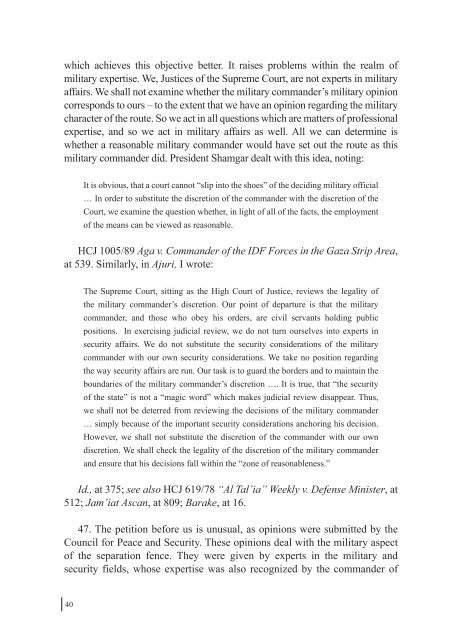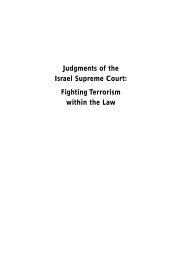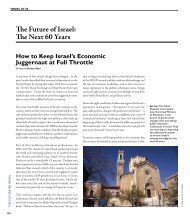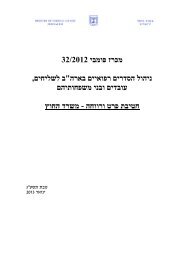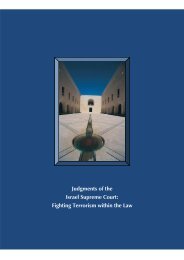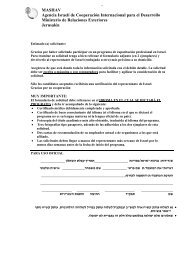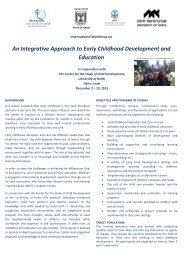Judgments of the Israel Supreme Court: Fighting Terrorism within ...
Judgments of the Israel Supreme Court: Fighting Terrorism within ...
Judgments of the Israel Supreme Court: Fighting Terrorism within ...
You also want an ePaper? Increase the reach of your titles
YUMPU automatically turns print PDFs into web optimized ePapers that Google loves.
which achieves this objective better. It raises problems <strong>within</strong> <strong>the</strong> realm <strong>of</strong><br />
military expertise. We, Justices <strong>of</strong> <strong>the</strong> <strong>Supreme</strong> <strong>Court</strong>, are not experts in military<br />
affairs. We shall not examine whe<strong>the</strong>r <strong>the</strong> military commander’s military opinion<br />
corresponds to ours – to <strong>the</strong> extent that we have an opinion regarding <strong>the</strong> military<br />
character <strong>of</strong> <strong>the</strong> route. So we act in all questions which are matters <strong>of</strong> pr<strong>of</strong>essional<br />
expertise, and so we act in military affairs as well. All we can determine is<br />
whe<strong>the</strong>r a reasonable military commander would have set out <strong>the</strong> route as this<br />
military commander did. President Shamgar dealt with this idea, noting:<br />
It is obvious, that a court cannot “slip into <strong>the</strong> shoes” <strong>of</strong> <strong>the</strong> deciding military <strong>of</strong>ficial<br />
… In order to substitute <strong>the</strong> discretion <strong>of</strong> <strong>the</strong> commander with <strong>the</strong> discretion <strong>of</strong> <strong>the</strong><br />
<strong>Court</strong>, we examine <strong>the</strong> question whe<strong>the</strong>r, in light <strong>of</strong> all <strong>of</strong> <strong>the</strong> facts, <strong>the</strong> employment<br />
<strong>of</strong> <strong>the</strong> means can be viewed as reasonable.<br />
HCJ 1005/89 Aga v. Commander <strong>of</strong> <strong>the</strong> IDF Forces in <strong>the</strong> Gaza Strip Area,<br />
at 539. Similarly, in Ajuri, I wrote:<br />
The <strong>Supreme</strong> <strong>Court</strong>, sitting as <strong>the</strong> High <strong>Court</strong> <strong>of</strong> Justice, reviews <strong>the</strong> legality <strong>of</strong><br />
<strong>the</strong> military commander’s discretion. Our point <strong>of</strong> departure is that <strong>the</strong> military<br />
commander, and those who obey his orders, are civil servants holding public<br />
positions. In exercising judicial review, we do not turn ourselves into experts in<br />
security affairs. We do not substitute <strong>the</strong> security considerations <strong>of</strong> <strong>the</strong> military<br />
commander with our own security considerations. We take no position regarding<br />
<strong>the</strong> way security affairs are run. Our task is to guard <strong>the</strong> borders and to maintain <strong>the</strong><br />
boundaries <strong>of</strong> <strong>the</strong> military commander’s discretion …. It is true, that “<strong>the</strong> security<br />
<strong>of</strong> <strong>the</strong> state” is not a “magic word” which makes judicial review disappear. Thus,<br />
we shall not be deterred from reviewing <strong>the</strong> decisions <strong>of</strong> <strong>the</strong> military commander<br />
… simply because <strong>of</strong> <strong>the</strong> important security considerations anchoring his decision.<br />
However, we shall not substitute <strong>the</strong> discretion <strong>of</strong> <strong>the</strong> commander with our own<br />
discretion. We shall check <strong>the</strong> legality <strong>of</strong> <strong>the</strong> discretion <strong>of</strong> <strong>the</strong> military commander<br />
and ensure that his decisions fall <strong>within</strong> <strong>the</strong> “zone <strong>of</strong> reasonableness.”<br />
Id., at 375; see also HCJ 619/78 “Al Tal’ia” Weekly v. Defense Minister, at<br />
512; Jam’iat Ascan, at 809; Barake, at 16.<br />
47. The petition before us is unusual, as opinions were submitted by <strong>the</strong><br />
Council for Peace and Security. These opinions deal with <strong>the</strong> military aspect<br />
<strong>of</strong> <strong>the</strong> separation fence. They were given by experts in <strong>the</strong> military and<br />
security fields, whose expertise was also recognized by <strong>the</strong> commander <strong>of</strong><br />
40


